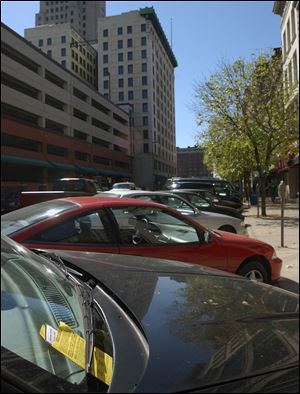
City in battle over parking enforcement
Police unions object to work done by downtown authority
12/24/2012
The Bell administration told the Downtown Toledo Parking Authority it could expand the types of tickets it writes to such spots as at fire hydrants and in loading zones and spaces for the disabled.
The city of Toledo is again fighting a battle on downtown parking ticket enforcement that it surrendered to its police unions nearly two years ago.
The Downtown Toledo Parking Authority, under orders from the Bell administration, has resumed writing tickets for vehicles parked illegally downtown — other than those at expired meters. The head of the city’s police patrolmen and command officers unions filed grievances claiming that is police work.
Dan Wagner, president of the Toledo Police Patrolman's Association, said a long history establishes those tickets as police work.
“The city is defending its position on the fact that AFSCME Local 7 allows subcontracting as long as one of its members is not laid off,” Mr. Wagner said. “The city has rescinded both times, so we are very comfortable.”
In October, 2010, the Bell administration ignored the objection of two unions and told the parking authority it could expand the types of tickets it writes for vehicles to include those illegally parked in spaces for the handicapped, at fire hydrants, and in loading zones. It backed down by early 2011 and reversed its decision.
The operation for downtown parking is worth millions, and now several agencies other than the city have their fingers in that pie.
The Toledo-Lucas County Port Authority paid the city of Toledo $12.4 million to buy three municipal parking garages and take over management of curbside metered parking, a deal that took effect in January.
The port authority in turn hired the Downtown Toledo Development Corp., run by Bill Thomas, for $60,000 a year to act as the middleman between the port and the parking authority.
Mr. Thomas is also executive director of the Downtown Toledo Improvement District.
He said the increased ticket enforcement is “not just a money grab.”
“If you are down here for a Walleye game, you really see it,” Mr. Thomas said. “Someone will park in a loading zone all day [and] nothing happens.
"And the same happens with no-stopping spots, and we have people parking and no one was doing any ticketing because people don’t have the time to do the ticketing,” he said.
After the port authority board obtained downtown parking, Mr. Thomas said he sent requests for proposals to 14 companies to operate the garages and monitor the meters, which includes collecting all the money and writing tickets.
He said five firms responded and the Downtown Toledo Parking Authority, which operates ParkSmart, was the winner.
The parking authority got the contract after it submitted the lowest bid, he said.
Matt Sapara, the port authority’s vice president for facilities development, could not immediately produce the five offers to show how much lower the parking authority's offer was.
Mr. Wagner said he has been frustrated for years with the city over its use of the parking authority, and not just because of the dispute over tickets.
He said the city loses millions of dollars by letting money flow to the parking authority without accountability. Mr. Wagner also said ParkSmart keeps a percentage of the tickets they collect.
According to the parking authority’s 2011 federal tax return, it had about $3.43 million in revenue that year and $3.45 million in expenses, for a loss of $24,986.
Expenses included $711,498 for city of Toledo debt service, $604,167 for city of Toledo debt reserve, and $175,709 for “outside contract services.”
Almost $1 million was for salaries and benefits.
Clayton Johnston, president of the parking authority, in 2009 was paid $89,326 and $37,769 in “other compensation” for a total of $127,095, according to the agency’s federal tax return that year.
Last year, Mr. Johnston was paid $94,326 and $17,769 in “other compensation” for a total of $112,095. Figures for 2010 were unavailable.
Mr. Johnston is planning to retire at the end of this year.
Contact Ignazio Messina at: imessina@theblade.com or 419-724-6171.